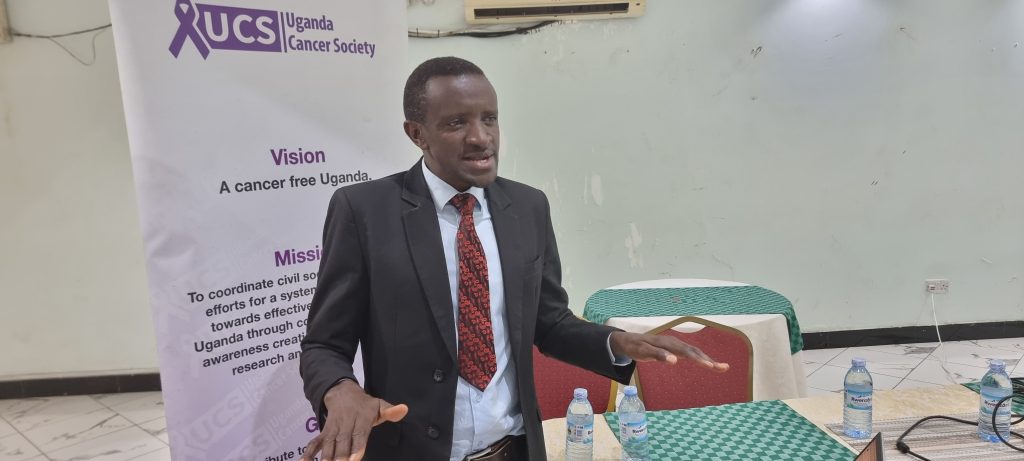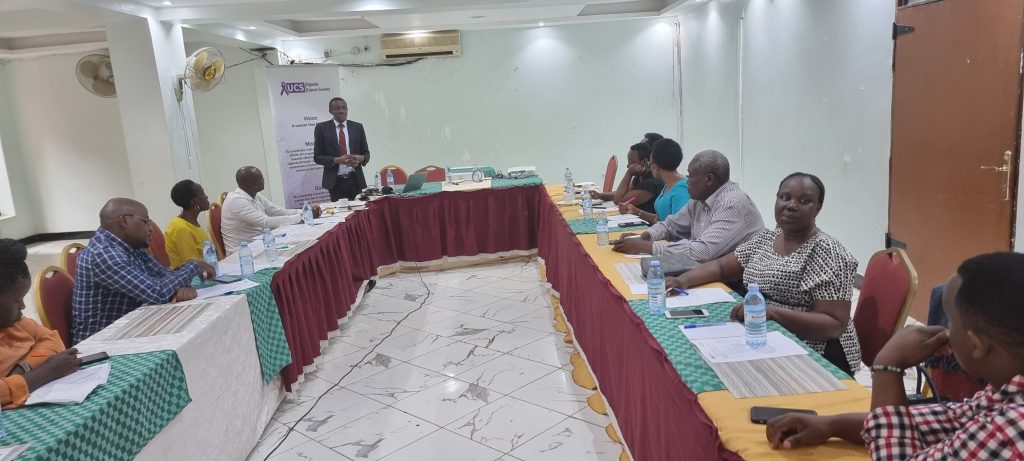Uganda Cancer Society Urges Giov’t to Speed up adoption of the Uganda National Cancer Control Plan

The government of Uganda has been asked to advance the adoption of the Uganda National Cancer Control Plan (UNCCP), a crucial tool which is intended to guide the agenda of bridging care gaps, leading to reduced cancer incidence and mortality while improving the quality of life for cancer patients.
Alfred Jatho, head of Community Cancer Services at the Uganda Cancer Institute (UCI), said UNCCP will strengthen survivor participation, engagement, and coordination in the cancer control and care work.

Dr Jatho was speaking on Thursday during a Patients/Survivors – Media Engagement event, at Emerald Hotel in Kampala, which brought together cancer patients, survivors, and media practitioners to discuss their roles within the NCCP.
This engagement provided a platform for survivors to share their personal stories and challenges in accessing cancer care, forming the basis for collaborative brainstorming on leveraging these personal narratives to promote the NCCP’s adoption and implementation.
Every year, Uganda joins the rest of the world to celebrate cancer survivorship in the month of June. The entire month is dedicated to raising awareness about cancer and raising voices about the challenges which cancer survivors face in communities.

A survivor is one who remains alive and continues to function during and after overcoming a serious hardship or life-threatening disease. In cancer, a person is considered a survivor from the time of diagnosis until the end of life.
‘’Cancer survivors bear the scars of cancer. Some patients end up undergoing radical surgeries with loss of body parts and hence need rehabilitation to regain functionality. Some survivors require reconstruction to rebuild the body image including those who undergo mastectomy for breast cancer’’, reads a statement from Uganda Cancer society.
Many survivors suffer from psychological effects such as living under constant fear of relapse or recurrence and others suffer from infertility leading to abandonment by their spouses and their families. In addition to the physical and psychosocial scars, many cancer survivors are left catastrophically impoverished due to the heavy costs associated with cancer care and the loss of their source of income.
Cancer remains a major public health challenge in Uganda. In 2022, 35,968 new cancer cases were diagnosed in Uganda, and 24,629 people died of cancer. Among females, cervical (33.8%) and breast cancers (14.6%) made up nearly half of new cancer cases in 2020, and cervical cancer is the leading cause of cancer death for women in Uganda. For males, prostate (17.5%), Kaposi sarcoma (17.4%), esophagus (9.6%) and liver (7.3%) cancers were the leading types of new cases .
Despite cancer being a major public health challenge, there is also a growing number of cancer survivors. However, the Ministry of Health is yet to develop policies to address issues of cancer survivorship in the country. Civil Society Organizations led by Uganda Cancer Society (UCS) play a crucial role in implementing survivorship activities. UCS is an umbrella of more than 40 Civil Society Organizations [CSOs] that play a key part within the cancer control continuum, ranging from raising awareness, advocacy, patient empowerment, fostering accountability, capacity building, palliative care and research, among others.
There have been some milestones in organizing survivors such as the Heroes Camp by Uganda Cancer Institute in partnership with members of UCS, annual national cancer survivor events by UCS, and supporting cancer survivors that are engaged in cottage industries (which manufacture artificial breasts), to mention but a few.
The Government of Uganda through the Ministry of Health and UCI has developed the Uganda National Cancer Control Plan (UNCCP). The UNCCP is a crucial tool which is intended to guide the agenda of bridging care gaps, leading to reduced cancer incidence and mortality while improving the quality of life for cancer patients. Following numerous stakeholder engagement efforts, the Plan is now awaiting adoption by the Top Management of the Ministry of Health.
‘’As we amplify awareness and advocacy in this month of June, we are cognizant of the central role which survivors play in realizing the targets of NCCP. Their first-hand experiences are instrumental in driving demand, ensuring adoption, and mobilizing grassroots support necessary for effective implementation’’, said officials from Uganda Cancer Society in a statement signed by Ms Brenda Nandutu.
The national umbrella organization of civil society organizations and individual actors in cancer work, want to join cancer survivors to present their joint request to different stakeholders.
‘’We ask the government to Speed up adoption of the Uganda National Cancer Control Plan. Also Establish a database for survivors of cancer and also develop and adopt a National Cancer Survivorship Plan’’, they noted.
They asked Corporate companies, private sector, and donor partners; support establishment of, and scaling-up operation of existing cottage industries that manufacture prostheses (artificial body parts for patients who undergo surgeries; Support establishment of a comprehensive rehabilitation and occupational therapy services or departments in facilities where cancer services are provided.
‘’we would like to inform the public that cancer survivors do exist in Uganda. Their stories of resilience and recovery are a testament to the effectiveness of early detection and timely treatment. However, without proper documentation, programs, and plans, these success stories remain largely untold. We therefore, emphasize the urgent need for, among others, the Government to adopt the Uganda National Cancer Control Plan as it will ensure that resources are utilized efficiently, healthcare providers are adequately trained, and patients receive consistent and high-quality care. It will also facilitate the establishment of a robust cancer registry, enabling us to track and support cancer survivors more effectively’’, noted further officials from Uganda Cancer Society.



